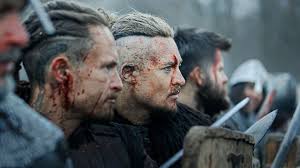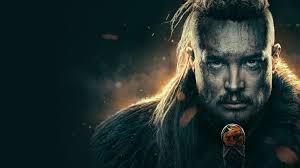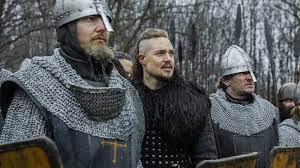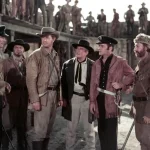🎬 The Last Kingdom: Seven Kings Must Die (2023)

The Last Kingdom: Seven Kings Must Die (2023) – A Riveting Conclusion to Uhtred’s Saga
The Last Kingdom: Seven Kings Must Die (2023) serves as a powerful finale to the epic journey of Uhtred of Bebbanburg, a character who has captured the hearts of fans across five seasons of the hit TV series The Last Kingdom. Directed by Edward Bazalgette and based on Bernard Cornwell’s The Saxon Stories, this historical drama delivers a thrilling blend of political intrigue, intense battles, and emotional depth. In this review, we’ll explore how this film ties up loose ends and leaves a lasting impact on the legacy of Uhtred and his world.
Plot Overview: The Struggle for Unity
Set in 10th-century England, Seven Kings Must Die follows Uhtred (Alexander Dreymon) as he faces his final and most challenging mission. With the death of King Edward, the land is thrown into chaos, as rival factions vie for control. Uhtred, once a reluctant warrior caught between his Saxon heritage and his Viking upbringing, must navigate treacherous alliances and personal loss to fulfill his destiny.
The central plot revolves around Uhtred’s role in uniting England under one crown, as King Aethelstan (Harry Gilby) seeks to solidify his rule. However, Aethelstan’s ambition and methods test Uhtred’s loyalty and moral compass. The title’s ominous prophecy—“Seven kings must die”—adds a sense of foreboding as Uhtred’s choices carry weighty consequences for the fate of England.
Performances: A Fitting Farewell for Beloved Characters
Alexander Dreymon shines as Uhtred, delivering a performance that encapsulates the character’s growth and complexity. Dreymon masterfully portrays Uhtred’s inner conflict, blending stoic determination with moments of vulnerability. His portrayal grounds the film, making Uhtred’s journey deeply resonant for viewers.
Harry Gilby’s portrayal of King Aethelstan is equally compelling. Gilby captures the nuances of a ruler torn between his vision for England’s future and the moral compromises he must make to achieve it. The supporting cast, including Mark Rowley as Finan and Arnas Fedaravicius as Sihtric, bring depth to their roles, adding emotional weight to the narrative.
Themes: Unity, Sacrifice, and Legacy
Seven Kings Must Die delves into themes of unity, sacrifice, and the cost of ambition. Uhtred’s journey highlights the sacrifices required to achieve a greater good, as he navigates personal loss and betrayal. The film also explores the idea of legacy—both Uhtred’s own and that of a nation on the brink of unification.
The prophecy of “Seven kings must die” serves as a thematic anchor, symbolizing the price of forging a united England. The film’s exploration of loyalty and betrayal adds depth to its characters, showing the human cost of political ambition and warfare.
Action and Cinematography: A Visual Feast
The battle sequences in Seven Kings Must Die are breathtaking, showcasing the film’s impressive production values. From large-scale clashes to intimate duels, the action is visceral and meticulously choreographed. The filmmakers’ attention to historical detail shines through, immersing viewers in the brutal realities of 10th-century warfare.
Bazalgette’s direction and Luke Bryant’s cinematography capture the rugged beauty of the English landscape, juxtaposing sweeping vistas with the grim realities of war. The use of natural lighting and earthy tones enhances the film’s authenticity, creating a visually stunning backdrop for the story.
Historical Accuracy: A Balance of Fact and Fiction
As with the series, Seven Kings Must Die takes creative liberties with historical events while remaining grounded in the broader context of 10th-century England. The film weaves historical figures and events with fictionalized elements to create a compelling narrative. Fans of Bernard Cornwell’s novels will appreciate the film’s faithfulness to the spirit of the source material, even as it condenses complex historical dynamics into a two-hour runtime.
Music and Sound: Amplifying the Drama
The film’s score, composed by John Lunn, is a standout element that enhances its emotional and dramatic impact. Lunn’s music seamlessly blends traditional and modern elements, creating a soundscape that reflects the film’s historical setting while amplifying its tension and pathos. The use of haunting choral arrangements and driving percussion heightens the stakes of key moments, immersing viewers in Uhtred’s world.
Conclusion: A Satisfying End to an Epic Saga
The Last Kingdom: Seven Kings Must Die is a fitting conclusion to a beloved saga, delivering a story that is both epic in scope and deeply personal. Alexander Dreymon’s performance anchors the film, while its themes of unity, sacrifice, and legacy resonate long after the credits roll.
For fans of the series, the film provides closure to Uhtred’s journey, tying up loose ends while leaving room for reflection. For newcomers, it offers an engaging entry point into the rich world of The Last Kingdom. With its compelling performances, stunning visuals, and thought-provoking themes, Seven Kings Must Die cements its place as a standout historical drama











